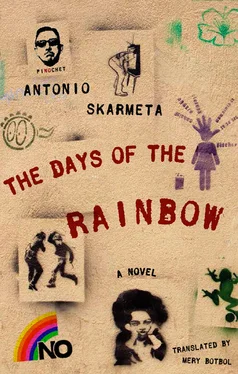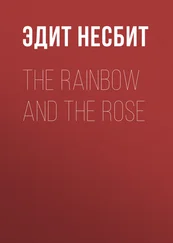The cops don’t allow Serrat to get off the plane. He shuts himself in the lavatory, and records a cassette with a journalist. “For Freedom” (play that song).
The young couple looks around; they collect coins and paper bills of very little value. They want to pay for a motel room. Freedom’s cheap love.
Me, Bettini, I ask Death to wait for a while; we need to pass September. This is my last wish — after October 5, I won’t ask for anything else. I only want freedom to wait with me for that date.
Girl dressed in black crosses Apoquindo Avenue. It’s the height of spring and her thighs swing to the rhythm of freedom.
Over the head of the bearded king, a cardboard crown tilts; freedom is coming.
That hand waving No wants freedom.
A carpenter saws a piece of wood; the sawdust that jumps is freedom.
The woman in love plucks a daisy; freedom loves me, loves me not.
The first spelling book — Dad loves Mom; the boy loves his cat; the girl loves freedom.
No bird or angel flies higher than freedom.
The Pacific Ocean elevates blue cathedrals up to the clouds; waves up and down, toward freedom.
Don’t tell me less, don’t tell me more, tell me just the right word — freedom.
Let’s see those palms, little ones, setting the beat, once more, clip, clap, clip, clap, once more, freedom.
Nico leaves Bettini’s notebook on the motel room’s nightstand.
But Patricia wants him to read one more time the prophecy — she uses this word— The young couple looks around; they collect coins and paper bills of very little value. They want to pay for a motel room. Freedom’s cheap love .
She asks him to help her with her bra.
Nico unhooks it, as if he were an expert.
He’s facing the back of the woman he loves. Her skin extends, pale, and for the first time he dares to touch with his lips a mole on her shoulder blade. The shoulder blade. Anatomy.
She turns toward him. Now her breasts are facing his mouth.
She seems to have sprouted up from that excited cloud floating outside the window.
She looks serious.
He smiles.
Together, they had put together the fifteen thousand pesos. A room for three hours. “Don’t fall asleep, kids, or else I’ll have to charge you an extra ten thousand. The two rum and Cokes are included.”
Freedom , he thinks.
And his tongue climbs up her neck, all the way up to Patricia Bettini’s mouth, and he sinks his tongue between her teeth.
She closes her eyes.
There has to be a way of doing it right.
A way to do it in style.
Like they had seen it in the movies.
Like they had imagined it so many times, amid wet sheets.
With the slow moaning, the swelling of the breasts, the erudite bulging of the virile member, the moistening of the belly, soaking it, his tongue must know how to find the exact spot, besiege it with the dexterity of a bullfighter, the planet’s tiny electrified spot.
He has to stay calm; everything is too fast. His hands squeeze and scratch, jumping from one side to another other, like two scared rabbits.
It would be necessary to be thirty years old, and to be a skin expert, to have a doctorate in breasts, to give pleasure to the beloved Patricia Bettini, pale and warm under the faint daylight that filters through the flower-print curtain — daisies, sunflowers, rhododendrons — in the oppressive shade of that hotel room, afflicted by an insolent sun that seems to want to set the port on fire.
Patricia leans against the padded green headboard, separates her knees, and lets the middle finger and forefinger of her right hand go down her belly.
She caresses the spot, the instant, the glass of sparkling champagne, while her other hand goes to Nico Santos’s nape.
Gently, but firmly, the other hand leads Nico’s head to her belly, defeats him, and the young student obeys, brushes against her straight brown hair, and on this journey he breathes, deeply, the smell of her victorious secretions.
Skillful, he touches with the tip of his tongue the small tiger hidden in that abrupt vegetation, darker than it appeared in his dreams, a shade wilder than the most Italian, placid brown of her mane, and curled as from a sudden electricity.
Up to this point there hadn’t been words, not even monosyllables, only the saliva on the skin, the rubbing of the thighs against the sheets, but now Nico Santos hears a word.
Patricia Bettini whispers “yes,” and repeats “yes,” and she says “yes” once and again, and “like that,” “like that,” and her fingers squeeze, electrified, Nico Santos’s skull, and she doesn’t say anything else, she doesn’t say “yes,” she doesn’t say “like that.” She remains ferociously quiet and focused, and she brutally clenches her teeth, and what Nico can’t see, what he doesn’t know yet, is that Patricia Bettini’s crying.
*Violeta Parra (Chilean songwriter). What follows is an adaptation of her song “Gracias a la vida.”

PATRICIA DRAWSthe printed curtain and opens the small window. The motel is high on the hill. She leans her forehead on the wooden window frame, tilts her neck, and looks out at the distance. The noises from the port sound stronger — cranes depositing huge crates on the ship decks, honks, ambulance alarms, the neighbors’ radios playing the hits of the week.
“Come.”
I walk over to her. She remains in the same position. Without looking at me, she takes my arm and puts it around her shoulders. She kisses my hand. It’s weird, because she’s far away and, at the same time, very much here. A divided body. Beautiful, loving, warm.
“Look,” she says, scrunching up her nose a little bit and pointing at the hills. “If you want to know me better, I’m like them.”
“What do you mean?”
“The hills and all that.”
“You’re like them.”
“I was just saying, silly. Me,” she says, tapping her chest, as if to mark the beating of her heart, “I’m this. I mean … if someone painted me and I were a landscape, I’d have many colors …
“Look here now. What do you see?”
“Many things.”
“Roofs, roof tiles, yellow, green, purple, blue, red, brick-red walls, chimneys, seagulls, pelicans, stairs, steps, cables within easy reach, overhead tramways like small houses climbing onto the rails, stray dogs, kites, and everything remains there, as if someone had put it that way, thoughtlessly, leaving everything for later.”
“And that’s how you are? You left yourself for later?”
“I mean, all those things that have happened to me in my life have a meaning. They’re here, with the same strong emotion that I felt at that moment, d’you know?”
“One of the things I like the most about you is that you almost never say d’you know? It’s interesting, because I see you …”
I stop. I kiss her naked shoulder and breathe in deeply the smell of her neck. Going over her skin helps me find the exact word …
“How do you see me?”
“Harmonious, tanned. Elegant, Patricia Bettini. That’s why I’m surprised to hear you comparing yourself with a carnival.”
She turns toward me, and with two fingers she gently caresses my eyelids.
“Maybe,” she says, smiling with her eyes but not with her lips, “it’s the typical post-virginity-lost trauma. Do you know where my harmony comes from?”
“I talked about it with your father.”
“Do you talk about me with my father!? What does he say?”
“That that’s your ‘Italian touch,’ an internal commotion but a clear expression.”
Читать дальше












